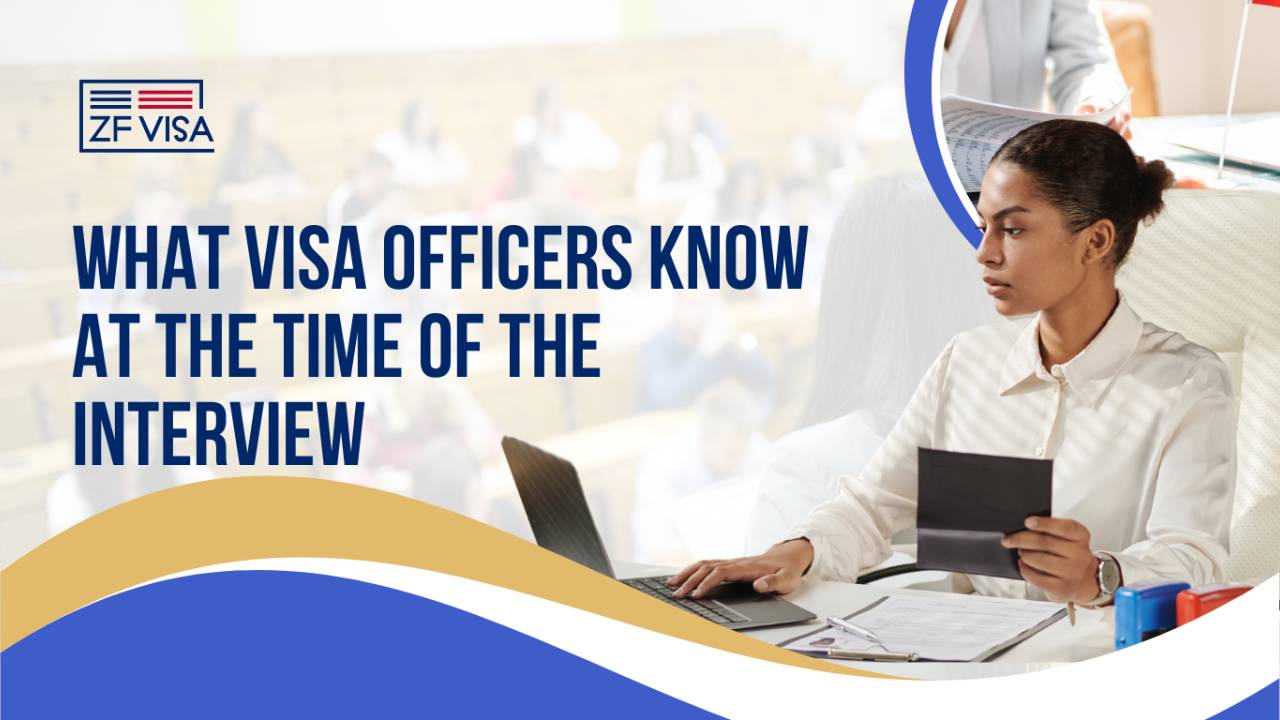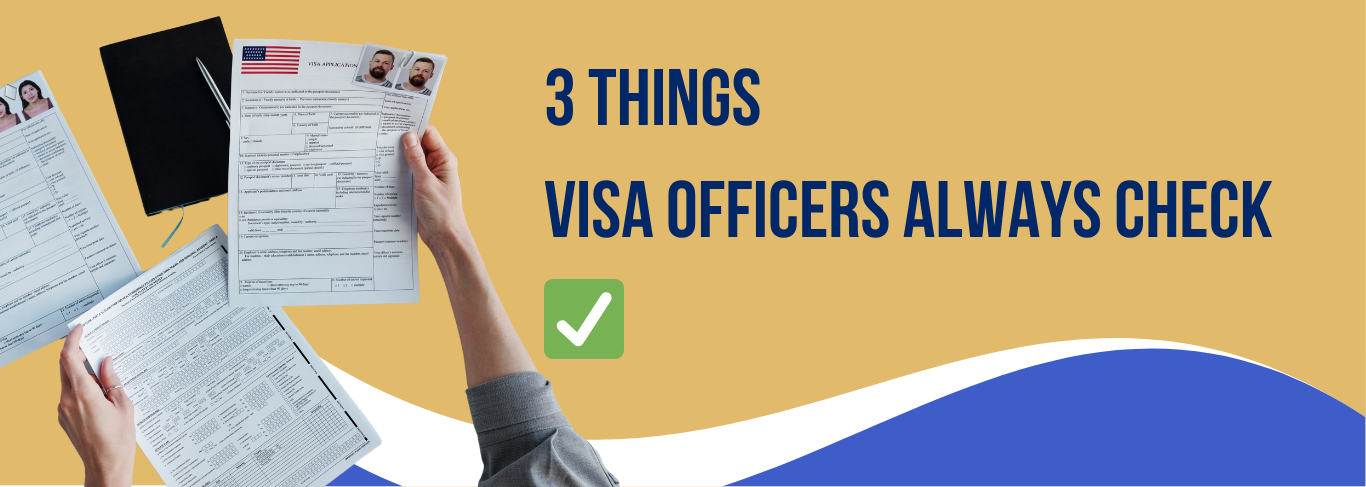
What Visa Officers Know at the Time of the Interview
Written by Travis and Mandy Feuerbacher, Former Visa Officers & Immigration Attorneys
Preparing for a visa interview? It can be nerve-wracking, but understanding what visa officers know about your case before the interview can help you feel more confident. Let’s break down exactly what they review and how to prepare effectively! 🎯
What Do Visa Officers Know Before the Interview? 📋
Visa officers typically don’t have much information about your case until right before the interview. The first thing your officer is likely to review before asking the first question is the responses you provided in your DS-160 application. As they review your responses, officers often consider the following details:
- How long are you planning to stay in the U.S.?
- What type of visa are you applying for?
- Do you have family in the U.S.?
- Have you been denied a visa before?
- What’s your job and monthly income?
- What’s your family situation (are you married, do you have children)?
🔑 Quick Tip: Visa officers are skilled at processing this information fast, even though they only have a few moments to review it. It might feel like a lot of questions, but they’re trained to evaluate this quickly and accurately!

Let’s dive into the 3 most important things visa officers always look at during your interview – generally before they ask the first question:
- Previous Visa Denials 🚫
The first thing they’ll check – usually after reviewing your DS-160 responses - is whether you’ve been denied a visa before. If you have, they’ll look at notes entered by officers during previous interviews to understand their specific reasoning for denying your application(s). If you've been denied multiple times, a justification for each denial will be in the system, and your next officer want to understand why another officer might have said no.
💡 Pro Tip: Make sure you’re well-prepared to discuss how your life has progressed or changed since previous visa denials. The last thing you want is to be caught off guard, as some officers can make a decision in as little as 30 seconds!
- Criminal Issues 📑
When you apply for a visa, your details are checked against various databases, including criminal records and other red flags. If anything suspicious pops up, the officer will ask questions about it. We recommend that you seek legal guidance if you have any criminal record in any country.
👀 Important: Be honest and ready to explain anything that may come up in these checks. How you handle these questions can make a big difference in your application.
- Immigrant Visa Applications
Lastly, they’ll check whether you have a pending green card application on file. This is crucial because non-immigrant visas (like B1/B2 Visitor Visas or F-1 Student Visas) require you to show that you’re not planning to stay permanently in the U.S. If someone has already filed for a green card on your behalf, that could raise red flags for your current visa application.
💬 Takeaway: If you have a pending green card application or immigrant visa petition, be prepared to address this during the interview. It doesn’t automatically mean a denial, but it may lead to additional questions and concerns.

How long should I prepare for my visa interview?
Ideally, start preparing at least a few weeks before your interview. Review your DS-160 thoroughly before you submit the form, gather supporting documents that might corroborate what you discuss during the interivew, and practice answering common visa interview questions. The more prepared you are, the more confident you'll be!
What should I do if I have a visa denial on my record?
If you've been denied a visa before, be ready to explain what has changed in your life since your last interview. Being honest and clear is crucial.
Can a pending green card application affect my visa approval?
Yes, it can! Visa officers will know if an immigrant visa has been filed on your behalf, so be honest in your DS-160 and if you’re asked during your interview. While green card applications automatically lead to denials, they may raise concerns and lead to additional questions during your interview. Be prepared to explain the situation.
What happens if I don’t answer questions correctly during the interview?
Incorrect or incomplete answers can lead to denials, and possibly even more severe complications. Visa officers are trained to spot inconsistencies, so honesty and preparation are key. It’s better to take a moment to think about your answer than to rush and offer incorrect information.
How fast will I know the outcome of my visa interview?
Typically, you’ll find out the decision immediately at the conclusion of your interview. However, if your Visa Officer needs additional documents, details, or simply more time to reach a decision, your case may be paused – what is referred to as Administrative Processing. In that case, an immigration attorney may be able to help you proceed.
Final Thoughts 💭
The visa interview can be a quick process, but it’s incredibly complex and important. How you engage with the officer, how you explain your situation, and how prepared you are can impact the outcome. That’s why it’s so essential to be thoroughly prepared and know exactly how to handle each question that comes your way.
As Visa Officers, we saw far too many people facing denials who may have qualified for the visas they sought. In many instances, these applicants were simply unprepared to explain their situation at home and their plans in the United States to demonstrate their qualifications for a visa. Don’t leave your application to chance. Make sure you understand what to expect during your interview, and what you’ll need to demonstrate to succeed.
Take the Next Step Towards Visa Approval
🎥 Watch: What Visa Officers know at the time of the interview (and the 3 things they check for!)
📩 Download: Your free step-by-step visa preparation guides, trusted by thousands of successful applicants. (Free F-1 Visa Guide & Free B-1/B2 Visa Guide)
🧳 Prepare: Enroll in our comprehensive visa interview course to boost your confidence and readiness.
Your approval isn’t based on luck - it’s based on preparation. Let’s make it happen!
Legal Note: The information provided does not constitute legal advice or a guarantee of visa approval. For specific legal guidance, contact ZF Visa & Immigration at [email protected].
Stay connected with news and updates!
Join our mailing list to receive the latest news and updates from our team.
We hate SPAM. We will never sell your information, for any reason.


